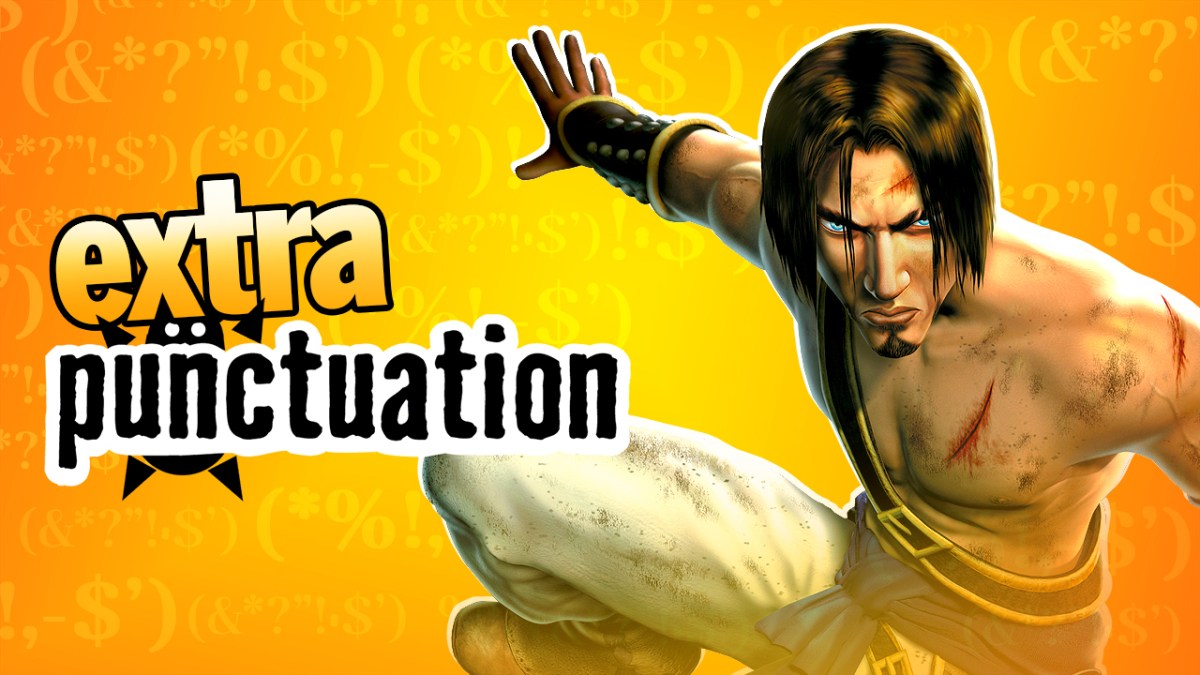This week on Extra Punctuation, Yahtzee looks back at Prince of Persia: The Sands of Time and why it’s his favorite love story in video games.
Extra Punctuation Transcript
At this time of year when we’re all being brought together by familial obligation, cold weather and being too full of pudding to move, my thoughts turn to the cozy subject of romance. Specifically, romance in video games. I’m a bit of a sucker for a good romance plot, I probably don’t give off that impression in Zero Punctuation since all I talk about is core gameplay loops and willies, but that’s because romance comes up so infrequently in video game plots. At least GOOD romances don’t.
The standard romantic subplot for a while was your basic action movie model – big muscly hero saves the day then puts his mouth on basically the only female character in the plot. In marginally more enlightened times, if romance came up it was in the form of some pedestal-mounted perfect waifu who dies either before or during the plot to motivate the broody hero, and isn’t it funny that that could equally describe Silent Hill 2 or Final Fantasy 7.
In more recent times a lot of games seem loathe to even touch upon romance at all. I think a lot of triple-A game stories in the modern era take themselves too seriously, and there’s a sense that romance somehow cheapens the experience. Which it does, if it’s crap, but then so does anything. I partly blame the preponderance of the “stoic hero” archetype who refuses to be distracted from their goal or show even a moment of human weakness. I’ve implied before it’s a strike against characters like Aloy from Horizon that you couldn’t imagine them go cruising for some action on a Saturday night.
Then you have the harem-style romance element in games like Mass Effect, Persona and Stardew Valley, which never feels authentic, because it revolves around every eligible character in the game somehow falling for a complete blank slate. In your average gamified romance system you can get off with basically anyone you badger for long enough, and you’d think a more rounded love interest character would have preferences of their own.
Let me give my criteria for what I consider a “good” love story. First of all, both participants have to be well-realised characters with distinct histories, personalities, flaws and motivations of their own. No token cardboard cutouts, no idealised waifu figures on pedestals. Secondly, there has to be a genuine chemistry between them that comes across in their interactions. Their dialogue over the course of the story should be what joins the dots between the initial mutual indifference and the ultimate outcome. No dude and lady snogging for no real reason other than that they were standing next to each other at the end.
Thirdly, the love story has to be an integral part of the plot. The ups and downs of the romance should be driving important character arcs and events. It can’t be incidental, or a reward either participant is receiving for having completed other, unrelated goals. And lastly, the romance should be fraught. It can’t just be a straight case of two people realising their in love, snog, cut to credits. It’s not interesting if you don’t throw some complications in the mix.
It might sound like a tall order, but there’s at least one video game I know of that does all of this, which I’ve long considered my favourite romance in game storytelling. I referenced it briefly in the last episode, actually, and knowing the way the Escapist designs thumbnails you probably already guessed what it is. Yes, it’s the love story from Prince of Persia: The Sands Of Time, between the titular prince and his main support NPC, Farah, fallen princess of a kingdom conquered by the prince’s dad. Already a bloody good game all story aside, the romance is what pushes it to all-time favourite status for me. It’s got what I’d consider the most genuinely erotic love scene in video games. Not that there’s much competition. The bit in Indigo Prophecy where you have to flick the analog stick while a pair of heaving buttocks glimmer in the moonlight can’t really compare.
I’m going to go into detail, so have a token spoiler warning. That was it. Do play it if you have the means to, but I’d forgive you if you couldn’t get past the crunchy PS2-era audio and kinda shitty combat. Anyway. I specified that both participants need to be well-characterised. And they are. Farah is an intelligent, dignified noblewoman whose sheltered, privileged upbringing has left her lacking practical skills, and a little bit naive. The Prince, meanwhile, is a legendary warrior with practical skills for days, but is held back by the fact that he is, without mincing words, an entitled arrogant bellend. When the Prince is ego stroked into unleashing the Sands of Time upon the kingdom, turning everyone except him and Farah into mindless monsters, the two are forced to work together to travel across the city and unite a couple of magical Maguffins.
The chemistry’s there straight away, because this is the princess of a fallen kingdom forced to ally with a dude who was pretty central to how it got fallen in the first place. Which to her credit she gets over surprisingly quick when the greater good is at stake, the strife between them is rooted in her being reliant on his skills while being obviously smarter and more level headed, and him instinctively flinching at being bossed around by a lady. She gets snarky at him, he gets sulky straight back, the moment he’s alone he starts muttering to himself about how she needs to toe the line like a proper woman, coming across the whole time as an absolute prize tit, and it’s both hilarious, and endearingly pathetic. This is what I mean by having a character arc. You’ve got to overcome your flaws. And by crikey does the Prince have flaws. He’s exactly the kind of pillock that you can tell no one ever said “no” to because if he wanted he could sommersault over them and split them in half lengthways with a scimitar.
As for the romance being fraught, that’s my favourite part of it. The point when they realise they’re in love is nowhere near the end of things. The Prince twigs to it about halfway through when he wakes up to Farah confessing her love while she thinks he’s unconscious. Very often in fiction showing a character is capable of love or being loved is used to in some way redeem them, and I adore that in this case it does absolutely nothing to redeem the Prince. In his next few solo monologues he jumps straight to deciding he’s going to marry her, her own ideas be damned, which will be just the thing to tame her insolence.
Not that Farah is entirely free of blame. There’s a bit where she tries to win the prince over by reading him some love poetry she found while he’s trying to sommersault his way around a library, which makes me think that she’s got her own skewed, slightly naive ideas of romance. It’s another thing that makes this romance exceptional – they’re both on equal footing and banging their corresponding personality flaws together, when in most video game love stories the romance object has no flaws and the onus is on the protagonist to prove themselves worthy of them.
But just as the Prince has decided to propose marriage the next time they talk, a monkey wrench is thrown into his plans when he has a sands-induced vision of the future showing Farah appear to betray him, and that sends the entire courtship off the rails, and his confusion and sense of betrayal leads to a wrong decision at a crucial moment and ultimately tragedy, at which point all the Prince’s insecure bellendiness disappears in the face of what was truly important.
At the very end of the game, magical Maguffin malarkey ends with the Prince reversing time to before Farah’s kingdom is invaded, giving him the chance to run to her palace and expose the evil Vizier who sets things in motion. But the Prince’s attempt to rekindle the romance is rebuffed for the obvious reason that Farah is now a stranger who had none of the character growth of the Farah from the original timeline. And so we end on a hauntingly bittersweet note with everyone alive and safe but with a wiser, more melancholy Prince forced to be tormented by memories of a lost love that no-one else remembers, over which he’ll no doubt be spanking himself raw for decades.
Although the actual tragedy is that they made sequels. Always a tricky proposition when the initial story is tied up with such a wonderfully neat bow. Although, Prince of Persia Warrior Within and Prince of Persia Two Thrones are pretty good games, all told. They manage to fix what made the combat in the first game shitty and I think if you could somehow merge the three games together, you’d have as near to perfection as you’ll ever get in this cold world.
But the sequels just can’t match the first game’s story, especially not the romantic element. They bring Farah back for Two Thrones and you can tell they’re trying to reawaken the chemistry from the first game but they just don’t have the writing chops anymore, and they turn Farah into a stock humourless action girl with no flaws who nonetheless gets damsel in distressed for the final boss. Oh, and the less said about Warrior Within, the better. The decision was made for that one to take the fantasy Arabian Knights vibe of the first game in a darker, edgier, very early 2000s-ier sort of direction, and there wasn’t a whole lot of romance in it. My Chemical Romance, maybe.






Published: Jan 5, 2023 01:00 pm